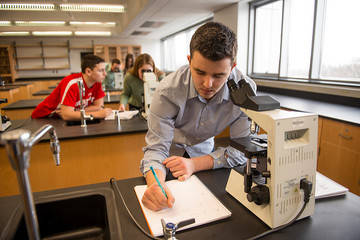
08/23/2017
SUNY Cortland’s efforts to educate the next generation of science, technology, engineering and math (STEM) teachers just got a major boost.
Representative Claudia Tenney (R-New Hartford) recently announced that SUNY Cortland was awarded a $1.6 million grant from the National Science Foundation (NSF) to support three years of Northeast Regional Noyce Conferences. The conferences support colleges and universities that have been awarded a Robert Noyce Teacher Scholarship Program from the NSF. This scholarship program provides resources for students seeking careers in STEM teaching who agree to teach in a high-need school district. The conferences are an opportunity for faculty and administrators to share best practices and create solutions for improving teaching and learning strategies in their STEM teacher programs.
Gregory D. Phelan, chair of SUNY Cortland’s Chemistry Department, is the principal investigator of the grant. Angela Pagano, associate professor of biological sciences at SUNY Cortland, and Lisa Gonsalves, chair of the Department of Curriculum and Instruction and associate professor of education and human development at the University of Massachusetts-Boston, are co-principal investigators. Kerri Freese, who works in SUNY Cortland’s Chemistry Department, will serve as project director and coordinate the Noyce conferences.
Since 2009, Phelan has secured nearly $4.6 million in federal funding toward the College’s Noyce program and Noyce conferences. Previous grants have directly supported year-long scholarships for SUNY Cortland students planning to teach STEM subjects in high-need schools.
“What this (latest) grant allows us to do is to go through and talk about our successes and challenges in STEM Teacher preparation programs at SUNY Cortland,” Phelan said. “We can show the training we’re providing for students and share that information throughout the whole Northeast and also with the nation when we go to the national meeting.”
Phelan added that the conferences are an opportunity for faculty, students and STEM teachers in the Northeast to meet and discuss new ways to better prepare and support STEM teachers in K-12 schools.
Phelan is planning to hold three workshops in the coming years in New York City, the Boston/Cambridge area and Albany. These workshops will bring together Noyce scholars and faculty from approximately 75 colleges and teacher preparation programs in the Northeast to discuss best practices and share results.
The Alan Alda Center for Communicating Science, headquartered at Stony Brook University, will partner with the Noyce program at these workshops to help STEM teachers learn how to express complex topics in a clear and engaging fashion.
The American Museum of Natural History will be a key resource during the New York City workshop as an informal learning partner. Phelan cited Lime Hollow Nature Center in Cortland as an example of locations outside the classroom that can encourage learning. One of SUNY Cortland’s Noyce Scholars, a math teacher, used the maple syrup production at Lime Hollow in the classroom to help students connect a real life example of how math is used.
“We want to bring teachers right to the museum so they can learn about the different resources they have to offer,” Phelan said. “We do the same thing locally at Lime Hollow for our Noyce Scholars. We’re looking at these informal STEM learning locations as a resource that teachers need to know about as a way to engage students.”
Phelan is passionate about teacher education, and holds both a Ph.D. in chemistry and a master’s degree in education from the University of Washington. He served as an NSF Graduate STEM Fellow in K-12 Education during his time in Seattle, working with educators and students to improve communication and teaching skills.
The new grant will allow SUNY Cortland students and faculty to continue to improve the College’s efforts in STEM education.
“This grant will allow us to talk to our peers about what challenges we’ve faced, how we’ve solved them and what efforts we can take to keep going,” Phelan said. “It’s a nice way to go through it rather than trying to reinvent the wheel. It’s a great chance for us to partner with other SUNY schools and make sure that we’re preparing future teachers the best way we can.”